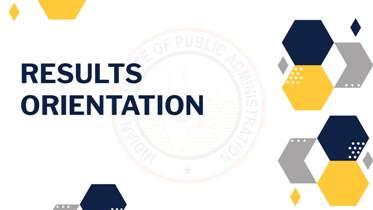
Introduction
The union has launched civil services capacity-building initiative called “Mission Karmayogi” in September 2020, which will apply to 4.6 million central government employees. The mission talks of a shift from “rule-based” to “role-based”, “linking training and development” to “competencies”, continuous learning opportunities at every level and not just senior levels. Taking the task, IIPA has developed a Competency Based Training Module focusing on the application of competencies with HRM practices. The CBT contains 30 competencies which have been categorized under five broad areas namely Ethos, Ethics, Equity, Efficiency and Productivity. Each competency has a definition and its proficiency levels. Further, each proficiency level has behavioral indicators which are objective, observable and measurable
Author: Ramit Maurya
Conceptual background: ‘Results Orientation’:
Under “Efficiency’ broad area, there is a competency named ‘Results Orientation’ which Promotes operational excellence and value for money in managing human capital and nurtures capability. In this paper, a competency namely ‘Results Orientation’ will be discussed under ‘Efficiency’ broad area.
Result-oriented is a term that focuses on outcome rather than methods used to achieve a goal or deliver a service. As a result, a variety of processes are used where the most effective and economical process is discovered.[2] It focuses on desired outcomes and achieves challenging objectives. Generally the attitude of many public functionaries is one of arrogance and indifference. Further, Government servants are rarely held to account and complaints to higher authorities usually go unheeded.[3]. The Hota committee (2004) also observed in the past that Most of the civil servants fail to achieve results because they are not given targets of performance or the infrastructural support to achieve them.
The results-oriented role for officers in the government is intended to similar that of profit-seeking managers in the private sector. Being result-driven is a vital quality that affects the career of a civil servant positively regardless of his profession, department, and career level. It means cultivating a culture of setting targets and accomplishing them.
The accountability in the public (government) sector has traditionally been based on compliance with rules, regulations and procedures. Now, when the public sector is deregulated, a new results-based system is needed to hold managers accountable. Governments are required to be Results-Oriented Governments. Accordingly, several countries (e.g., New Zealand, UK and Australia) have attempted to adopt Results-Oriented Government in order to create value for money through focusing on results not on inputs, processes and compliance and focusing on creating value for available resources instead of spending the available resources.
How result-orientation affects efficiency
Efficiency measures relationship between inputs and outputs or how successfully the inputs have been converted into outputs. Efficiency refers to the act of performing activities with minimum wastage of time and optimum usage of resources, so that the work done is faster and in an error free manner.
The efficiency basically is a comparison of the output from a process or an operation to the input. A high level of efficiency implies a minimal amount of wasted time, effort, capacity, materials, and so forth. This can translate into a high level of competitiveness and profitability in the organization. The efficiency can be mathematically represented as:
Efficiency = (Output ÷ Input) x 100%
Efficiency is focused on the inputs and outputs or how successfully the inputs have been transformed into outputs. Efficiency measures are likely to be more beneficial as an internal gauge of prudent resource use over time.
Targets and measures related to result orientation will help in developing employee focus in that direction. The result orientation focuses on efficient and effective government. Efficiency measures relationship between inputs and outputs or how successfully the inputs have been transformed into outputs.
The benefit of having a result oriented mindset is that, it boosts efficiency. Alongside saving time, there is more opportunity for efficiency of tasks to grow to reach goals. In a technically advancing world, process shrink in size every day. Having a result oriented mindset will help to see the clearest, fastest path to reach the goal than getting overly focused and lost among the process drawn out to get there.
Conclusion
Hence it is proposed to adopt partially some of the features of result orientation parameters along with the existing system. It is important for organizations to set targets and achieve them as it shows how effective they are. Targets can motivate individuals/employees to higher performance. However to achieve results target must be challenging but not impossible. The importance of teams in organizations cannot be over-emphasized. However leaders or senior officers need to understand how to develop and maintain teams for maximum performance.
It is focusing more on improving competencies, skills, and updating knowledge of all government servants. In this era of globalization there is need for result oriented target setting and effective leadership of teams in order to enable organizations respond quickly to changes in the environment. A results-based culture creates an environment of success for the employees, leadership and organization.
References